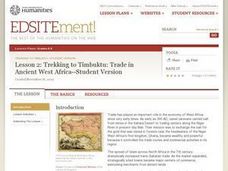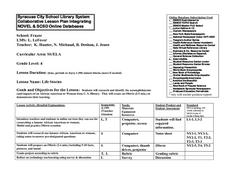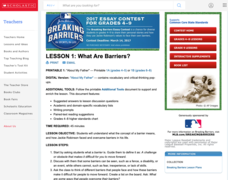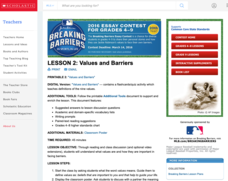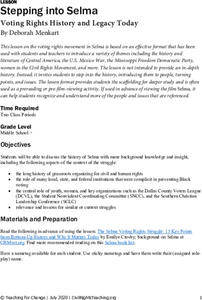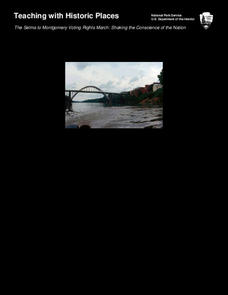Curated OER
O Canada
Students examine the history of Canadian settlement through an interactive program. They learn why some parts of the country where more heavily populated than others. They discover what life is like for a Canadian and their government...
Curated OER
Black Skin, White Justice: Race Matters in the Criminal Justice System
Learners examine the effects of race in the criminal justice system. As a class, they brainstorm a list of instances when the offender has been an African American and he is not treated fairly in court based on his race. They analyze...
Curated OER
Language Arts Lesson: Printing and Publishing
Students listen to an African folktale about an animal character that can walk and talk and retell the main events of the story in their own words. They illustrate the folktale utilizing a relief printmaking method as a replica of an...
Curated OER
Native Lands: Indians in Georgia
Young scholars investigate the Native Americans of the Muscogee Creek and their use of the land. In this U.S. history lesson, students investigate the importance of the deer for the Muscogee Creek peoples' way of life and the many uses...
Curated OER
Building Bridges for Young Learners--Culture
Students explore the concept of "culture." In this cross curriculum literacy and world history lesson, students listen to a letter written by a child from Namibia, then compare and contrast life in Africa with their own life. Students...
Curated OER
Trekking to Timbuktu: Trade in West Africa (Lesson 2)
Students examine the importance of trade in West Africa. Using a virtual time capsule, they travel back to ancient times and travel along with a caravan. They answer specific questions related to the journey and items they are trading....
Curated OER
Comparison of Colonial Regions in British North America
Students compare and contrast the colonies in British North America. As a class, they brainstorm a list of people, places and ideas associated with the Colonial Era. They discover the relationships and interactions between the...
Curated OER
Philanthropy and You
Students identify human rights and study the values of historical figures who fought for human rights. In this human rights lesson, students define the term human rights and research examples of human mistreatment in history. Students...
Curated OER
Life Stories
Fourth graders create a brief video presentation documenting their research of an impactful African American or woman from history. Students research and identify their accomplishments and create a 2-5 minute iMovie documenting their...
Curated OER
African-American History and Culture in the English Classroom
Ninth graders identify and recognize characteristics of nonfiction in literary works, explore language and culture of Gullah people, compare and contrast purposes of spirituals and quilts in terms of their relationships to escape from...
Curated OER
Looking at the Civil War through the lens of local history." Teaching
Students research life in Plymouth during the Civil War. Using the internet and other resources, students examine the historical effects of the Civil War. In groups, they publish a newspaper explaining the events of the day.
Curated OER
Violence Prevention
Compare and contrast the ideologies of Malcolm X and Martin Luther King, Jr. Middle schoolers conduct research regarding civil rights and rhetorical strategies used in political speechs. They examine the strategies that both men employed...
Curated OER
The Homefront: America and WWII
Students are introduced to the experiences of various groups of Americans at home during WWII, highlighting race, gender, and ethnicity. They improve their ability to analyze and interpret historical documents and images.
Scholastic
Lesson 1: What Are Barriers?
Scholars discuss the concept of a barrier with a short passage on Jackie Robinson. The writing process begins with a paragraph and several other sentences about Robinson's unique traits that made breaking a barrier possible.
Scholastic
Lesson 2: Values and Barriers
Scholars investigate and discuss the importance of values and how they can be used to break barriers. Small groups work collaboratively to examine the text and draw inferences to answer questions. A writing assignment challenges pupils...
Core Knowledge Foundation
Ray Charles
Introduce young learners to the read-aloud process with a short biographical passage about Ray Charles. After listening to the passage, class members respond to factual, inferential, and evaluative questions, and then create a timeline...
C-SPAN
1968: The Poor People's Campaign
The Poor People's Campaign of 1968 marked a shift in the civil rights movement to economic issues. Speakers in four C-SPAN video clips discuss different aspects of the campaign including Resurrection City, the Economic Bill of Rights,...
American Chemical Society
Norbert Rillieux, Thermodynamics and Chemical Engineering
The man who invented the earliest examples of chemical engineering was an American-born, French-educated, free man of color before the Civil War, and went on to translate Egyptian hieroglyphics. There is something of interest for almost...
Historic New Orleans Collection
Exploring Primary Sources: Music in New Orleans
Looking for a new and exciting way to teach young historians the art of primary source analysis? Jazz up your lesson with a resource that asks class members to analyze photos, travel documents, and letters written by some of New Orleans'...
Teaching for Change
Stepping into Selma
The 1964 Selma to Montgomery, Alabama voting rights marches are the focus of a lesson designed to introduce learners to people who took part in the Civil Rights Movement. Class members set into the role of one of the participants,...
PBS
Out of the Shadows | Black America Since MLK: And Still I Rise
Two powerful video clips launch a study of race relations in the United States after the Selma, Alabama riots, the passage of the Votings Rights Act, and the riots in Watts, California.
National Park Service
The Selma to Montgomery Voting Rights March: Shaking the Conscience of the Nation
Travel back in time to examine how tragic events can spur positive change. Scholars explore the impact of the Selma Voting Rights March, including the tragic loss of life and the later signing of the Voting Rights Act of 1965. Academics...
Center for History Education
Brown v. the Board of Education: Success or Failure?
Desegregation does not mean equality. An eye-opening lesson plan focuses on the impact of the Brown v. Board of Education decision to end school segregation. Scholars review a series of political cartoons to understand how the public...
Academy of American Poets
Teach This Poem: "On Being Brought from Africa to America" by Phillis Wheatley
Phillis Wheatley's poem, "On Being Brought from Africa to America" is the focus of a lesson that asks readers to consider how the poem is a critique of slavery. Groups comprise a list of words and phrases they notice as well as questions...
Other popular searches
- West African History
- African American History Month
- African History South Africa
- Ancient African Civilizations
- African History Month
- Dance History African
- South African History
- African History of Humans
- African History and Roots
- African History Research
- African History Lesson
- African History Western







